Katherine Johnson is a remarkable woman, but you don’t need me to tell you that, all you have to do is look at her CV. She was one of Nasa’s ‘human computers’ – a physicist whose job, among other things, was to calculate trajectories and flight times for the Apollo 11 moon landing in 1969.
Katherine was pivotal to the success of the mission and she did so using just a slide rule and pencil. That a woman could achieve such a distinction at a time when men ruled the employment roost is remarkable – but that the woman in question also happened to be black is downright amazing.
For her work in helping to win the space race, Katherine Johnson (now 97) was awarded the Presidential Medal of Freedom last year by President Obama. Her story is told in the book, and soon-to-be-released movie, Hidden Figures.

Katherine Johnson
Katherine’s life and achievements are intriguing, but what really fascinates is the historical space (no pun intended) that her story inhabits. Quite frankly, the history we tend to read about black achievement and struggle usually centres not on the space race but on race itself – on issues like Civil Rights and the fight against slavery.
We are used to viewing black history through this prism, so when you throw in the fact that a very smart and very determined black woman helped put humans on the moon, that makes a lot of people suddenly pay attention.
It made me wonder, though, what other historical spaces have been overlooked when it comes to black people. For instance, what about all those black men who fought in Nazi armies during World War II. We don’t tend to read about the Phalange Africaine Legion, which fought for Hitler in the North Africa campaign, or the Free Arab Legion which formed part of the force that occupied Greece and which fought partisans in Yugoslavia.
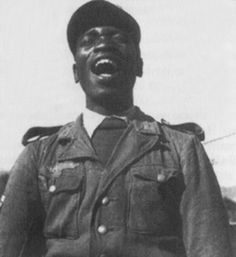
Free Arab Legion soldier
Similarly, we read little about those black people who struggled to survive after falling prey to Nazi race laws and who were described as ‘of alien blood’ in Nazi Germany and were prohibited from marrying or having sex with ‘people of German blood’.
In the Rhineland, a programme was established, which led to up to 500 mixed-race children (conceived when French African colonial troops occupied the region) being sterilised lest they ‘contaminate’ the Aryan bloodline.
For some reason, the notion of black people living in Nazi Germany seems to be off our radar.
But it’s not just there that we have lost sight of the black experience. The American Civil War is another case in point. The 54th Massachusetts Regiment is celebrated for being the first black Union regiment of soldiers in the US Civil War. Books have been written and films made describing their fighting acumen and bravery.
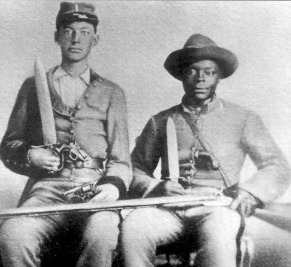
A black man in Confederate uniform
As fascinating as they were, we hear little in popular culture about the black Confederate soldiers who fought during that conflict. They did exist (their numbers have been hotly debated), but their story is still waiting to be told. Maybe the notion of black people – even a tiny minority – supporting the Southern states is just too much to contemplate for some.
The popular history of America’s West also gives short shrift to the black experience. We tend to see the Old West through the stories of white settlers and ‘red’ Indians – the colour black doesn’t get much of a look-in, particularly when it comes to those charged with enforcing the law in those days.
Bass Reeves may be well-known to some, but for most of us I’d wager his name draws a blank. It shouldn’t because Bass had an extraordinary life. As the first black deputy west of the Mississippi, he worked for the ‘Hanging Judge’, Isaac Parker. For 32 years, he would serve in various districts.
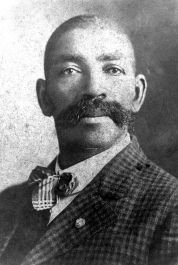
Bass Reeves
By his own reckoning, he arrested 3,000 criminals and shot dead 14 outlaws. Based on his success as a lawman alone, his story certainly deserves to feature more prominently in the history of the Old West than some other ‘characters’ from that era who are better known than he is.
Of course, I might just be highlighting my own ignorance when it comes to black endeavour and not the fact that cases like black Nazi soldiers and black lawmen are little known.
For instance, I’d never heard of Matthew Henson, who is credited as being the first African-American Arctic explorer. Born in 1866 to a family of sharecroppers, Matthew fist went to sea as a cabin boy at the age of 12. He would go on to make seven voyages to the Arctic alongside explorer, Commander Robert Peary.
The Commander would be feted for his endeavours, but for decades Henson was only recognised within the black community. He would later be honoured by presidents, books would be written about him, and he was given a hero’s burial at Arlington Cemetery.
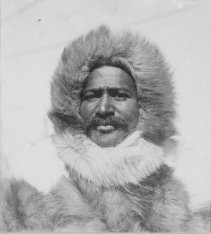
Matthew Henson
So, ultimately, Henson was recognised for his efforts. Yet, why did it come as a surprise to me to find a black face in the vast white landscape of the Arctic? Perhaps it’s a result of viewing black people through their experiences on American soil. That’s certainly how I viewed Frederick Douglass.
That great abolitionist, orator, writer and one-time slave, Douglass is a man synonymous with high intellect and great rhetoric. I can imagine his high-flown oratory at public meetings in America where he might debate with proponents of slavery or argue for women’s rights.
But that a black man of such titanic intellect traversed my own isle of Ireland in 1845 and debated the issues of the day… well it’s hard to get one’s head around.
It was only until relatively recently that I discovered the great orator had come to Ireland on a lecture tour for four months at the outset of the famine, and that he had stood alongside Ireland’s ‘Liberator’ Daniel O’Connell, in whom Douglass found a match for his own great oratory.
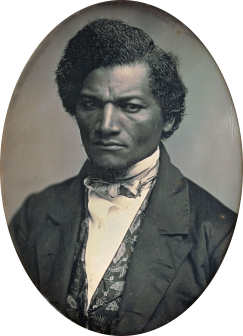
Frederick Douglass
And what a wordsmith Douglass was. Here’s what he had to say about his time in Ireland:
‘I am covered with the soft, grey fog of the Emerald Isle. I breathe, and lo! the chattel becomes a man. I gaze around in vain for one who will question my equal humanity, claim me as his slave, or offer me an insult. I employ a cab—I am seated beside white people—I reach the hotel—I enter the same door—I am shown into the same parlour—I dine at the same table—and no one is offended… I find myself regarded and treated at every turn with the kindness and deference paid to white people. When I go to church, I am met by no upturned nose and scornful lip to tell me, ‘We don’t allow niggers in here!’
Much like the notion of Oscar Wilde’s lecture tour of America, or Sitting Bull’s presence in England as part of Buffalo Bill’s Wild West Show, I suppose we can sometimes find certain historical scenarios hard to envisage. So, perhaps I am not alone in finding it surprising to view black lives in the context set out above.
One thing’s for sure, though. February is designated Black History Month in some parts, and we should all make it our business to delve more deeply into the stories of black lives down the centuries.
I’ll be wading through aspects of the past that I had neatly pigeonholed as being areas of white experience. I will seek out the black stories there that may have been lost in the mix, I will rummage for that forgotten voice – the one that tells a tale unheard by many of us, and then I will marvel at the deep, dark recesses of my own ignorance.


Thanks, David. “…highlighting my own ignorance…” will be a phrase I will ponder for myself today; perhaps for days to come.
LikeLike
Cheers Bill!
LikeLike
Reblogged this on writerchristophfischer and commented:
February is designated Black History Month in some parts, and we should all make it our business to delve more deeply into the stories of black lives down the centuries. – Thanks David for this great post!
LikeLike
Thanks Christoph. Hope all is well with you
LikeLike
We tend to create and live by stereotypes, isn’ìt that so? And the biggest stereotype of all is that people in the past were not really like us. That they didn’t travel. That they didn’t live in places different from where they were born. That people of different walks of life didn’t interact. That people who belonged to very different cultures didn’t really respect each others.
We tend to think this is OUR achievent. But history is far more complex than this. And our anchestors are far more complex than this.
I think we should try and approach history with an open mind and see what it has to offer us. It will surprise us in many occasions 😉
LikeLike
Perfect way of putting it, Sarah.
LikeLike
Wonderful stuff. I really enjoyed learning about Katherine Johnson through the movie Hidden Figures – had to come home and start an internet search to learn about the real person!
LikeLike
Glad you liked it Noelle. She is a remarkable woman
LikeLike
Indeed. I love finding women who have been integral to our history – all sorts!
LikeLiked by 1 person
I knew about Katherine Johnson (was she an ‘ancestor’ of Star Trek’s Lieutenant Uhuru?), but not the terrific Bass Reeves. We know about Frederick Douglass because of his work as an abolitionist, but little about black lives the next layer down where black people lived standard lives and achieved in their own speciality like Katherine Johnson or were notorious as in the Nazi special units.
(By the way ‘Half-Blood Blues’ by Esi Edugyan featuring a racially mixed jazz group in late 1930s Germany is fascinating.)
In a way it parallels the struggle for visibility and recognition of women. We knew about the trailblazers, but it took some time (and I’m not sure we’re there yet) for women in their ordinary lives to be recognised on equal terms.
LikeLike
The parallel with women’s visibility is a good one, Alison.
LikeLike
Pingback: It is really a Honor, to be a Black Person, in America, not a Disgrace….Rock Black History Month, my People… | Ms. Shada Burks/ Self Published Author